Yuxuan Fan
SONIC: Segmented Optimized Nexus for Information Compression in Key-Value Caching
Jan 29, 2026Abstract:The linear growth of Key-Value (KV) cache remains a bottleneck for multi-turn LLM deployment. Existing KV cache compression methods often fail to account for the structural properties of multi-turn dialogues, relying on heuristic eviction that risks losing critical context. We propose \textbf{SONIC}, a learning-based framework that compresses historical segments into compact and semantically rich \textbf{Nexus} tokens. By integrating dynamic budget training, SONIC allows flexible adaptation to varying memory constraints without retraining. Experiments show that at compression ratios of 80\% and 50\%, SONIC consistently outperforms baselines such as H2O and StreamingLLM on four diverse multi-turn benchmarks. Specifically, on the widely used MTBench101 benchmark, SONIC achieves an average score improvement of 35.55\% over state-of-the-art baselines, validating its effectiveness in sustaining coherent multi-turn dialogues. Furthermore, SONIC enhances deployment efficiency, accelerating the overall inference process by 50.1\% compared to full-context generation.
Deconstructing Pre-training: Knowledge Attribution Analysis in MoE and Dense Models
Jan 13, 2026Abstract:Mixture-of-Experts (MoE) architectures decouple model capacity from per-token computation, enabling scaling beyond the computational limits imposed by dense scaling laws. Yet how MoE architectures shape knowledge acquisition during pre-training, and how this process differs from dense architectures, remains unknown. To address this issue, we introduce Gated-LPI (Log-Probability Increase), a neuron-level attribution metric that decomposes log-probability increase across neurons. We present a time-resolved comparison of knowledge acquisition dynamics in MoE and dense architectures, tracking checkpoints over 1.2M training steps (~ 5.0T tokens) and 600K training steps (~ 2.5T tokens), respectively. Our experiments uncover three patterns: (1) Low-entropy backbone. The top approximately 1% of MoE neurons capture over 45% of positive updates, forming a high-utility core, which is absent in the dense baseline. (2) Early consolidation. The MoE model locks into a stable importance profile within < 100K steps, whereas the dense model remains volatile throughout training. (3) Functional robustness. Masking the ten most important MoE attention heads reduces relational HIT@10 by < 10%, compared with > 50% for the dense model, showing that sparsity fosters distributed -- rather than brittle -- knowledge storage. These patterns collectively demonstrate that sparsity fosters an intrinsically stable and distributed computational backbone from early in training, helping bridge the gap between sparse architectures and training-time interpretability.
AirCopBench: A Benchmark for Multi-drone Collaborative Embodied Perception and Reasoning
Nov 14, 2025
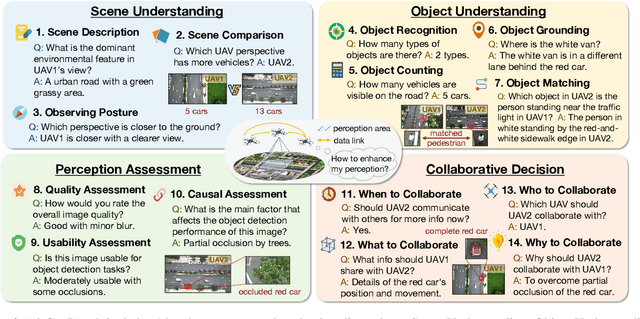
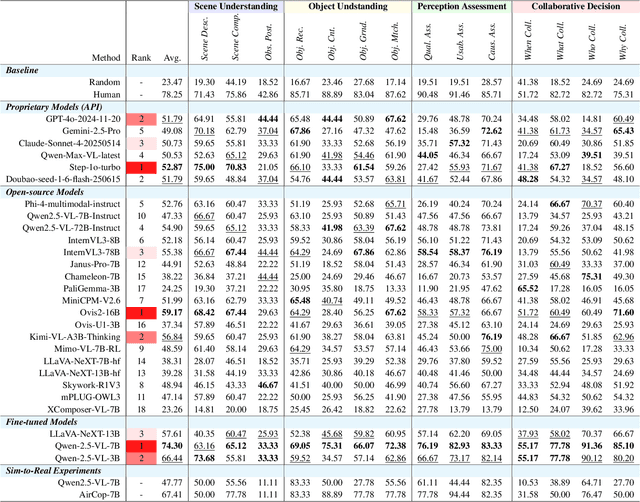
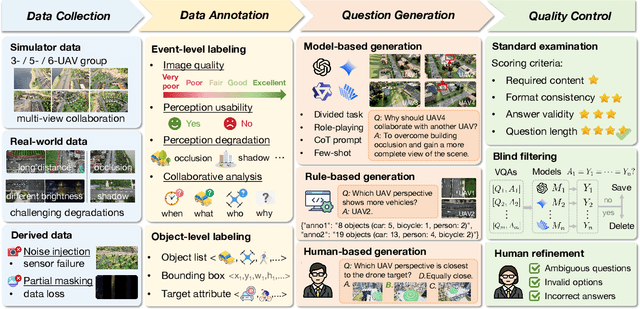
Abstract:Multimodal Large Language Models (MLLMs) have shown promise in single-agent vision tasks, yet benchmarks for evaluating multi-agent collaborative perception remain scarce. This gap is critical, as multi-drone systems provide enhanced coverage, robustness, and collaboration compared to single-sensor setups. Existing multi-image benchmarks mainly target basic perception tasks using high-quality single-agent images, thus failing to evaluate MLLMs in more complex, egocentric collaborative scenarios, especially under real-world degraded perception conditions.To address these challenges, we introduce AirCopBench, the first comprehensive benchmark designed to evaluate MLLMs in embodied aerial collaborative perception under challenging perceptual conditions. AirCopBench includes 14.6k+ questions derived from both simulator and real-world data, spanning four key task dimensions: Scene Understanding, Object Understanding, Perception Assessment, and Collaborative Decision, across 14 task types. We construct the benchmark using data from challenging degraded-perception scenarios with annotated collaborative events, generating large-scale questions through model-, rule-, and human-based methods under rigorous quality control. Evaluations on 40 MLLMs show significant performance gaps in collaborative perception tasks, with the best model trailing humans by 24.38% on average and exhibiting inconsistent results across tasks. Fine-tuning experiments further confirm the feasibility of sim-to-real transfer in aerial collaborative perception and reasoning.
ACE: Attribution-Controlled Knowledge Editing for Multi-hop Factual Recall
Oct 09, 2025


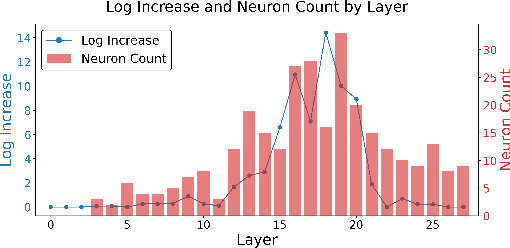
Abstract:Large Language Models (LLMs) require efficient knowledge editing (KE) to update factual information, yet existing methods exhibit significant performance decay in multi-hop factual recall. This failure is particularly acute when edits involve intermediate implicit subjects within reasoning chains. Through causal analysis, we reveal that this limitation stems from an oversight of how chained knowledge is dynamically represented and utilized at the neuron level. We discover that during multi hop reasoning, implicit subjects function as query neurons, which sequentially activate corresponding value neurons across transformer layers to accumulate information toward the final answer, a dynamic prior KE work has overlooked. Guided by this insight, we propose ACE: Attribution-Controlled Knowledge Editing for Multi-hop Factual Recall, a framework that leverages neuron-level attribution to identify and edit these critical query-value (Q-V) pathways. ACE provides a mechanistically grounded solution for multi-hop KE, empirically outperforming state-of-the-art methods by 9.44% on GPT-J and 37.46% on Qwen3-8B. Our analysis further reveals more fine-grained activation patterns in Qwen3 and demonstrates that the semantic interpretability of value neurons is orchestrated by query-driven accumulation. These findings establish a new pathway for advancing KE capabilities based on the principled understanding of internal reasoning mechanisms.
Towards Better Dental AI: A Multimodal Benchmark and Instruction Dataset for Panoramic X-ray Analysis
Sep 11, 2025



Abstract:Recent advances in large vision-language models (LVLMs) have demonstrated strong performance on general-purpose medical tasks. However, their effectiveness in specialized domains such as dentistry remains underexplored. In particular, panoramic X-rays, a widely used imaging modality in oral radiology, pose interpretative challenges due to dense anatomical structures and subtle pathological cues, which are not captured by existing medical benchmarks or instruction datasets. To this end, we introduce MMOral, the first large-scale multimodal instruction dataset and benchmark tailored for panoramic X-ray interpretation. MMOral consists of 20,563 annotated images paired with 1.3 million instruction-following instances across diverse task types, including attribute extraction, report generation, visual question answering, and image-grounded dialogue. In addition, we present MMOral-Bench, a comprehensive evaluation suite covering five key diagnostic dimensions in dentistry. We evaluate 64 LVLMs on MMOral-Bench and find that even the best-performing model, i.e., GPT-4o, only achieves 41.45% accuracy, revealing significant limitations of current models in this domain. To promote the progress of this specific domain, we also propose OralGPT, which conducts supervised fine-tuning (SFT) upon Qwen2.5-VL-7B with our meticulously curated MMOral instruction dataset. Remarkably, a single epoch of SFT yields substantial performance enhancements for LVLMs, e.g., OralGPT demonstrates a 24.73% improvement. Both MMOral and OralGPT hold significant potential as a critical foundation for intelligent dentistry and enable more clinically impactful multimodal AI systems in the dental field. The dataset, model, benchmark, and evaluation suite are available at https://github.com/isbrycee/OralGPT.
Not Only Consistency: Enhance Test-Time Adaptation with Spatio-temporal Inconsistency for Remote Physiological Measurement
Jul 10, 2025Abstract:Remote photoplethysmography (rPPG) has emerged as a promising non-invasive method for monitoring physiological signals using the camera. Although various domain adaptation and generalization methods were proposed to promote the adaptability of deep-based rPPG models in unseen deployment environments, considerations in aspects like privacy concerns and real-time adaptation restrict their application in real-world deployment. Thus, we aim to propose a novel fully Test-Time Adaptation (TTA) strategy tailored for rPPG tasks in this work. Specifically, based on prior knowledge in physiology and our observations, we noticed not only there is spatio-temporal consistency in the frequency domain of rPPG signals, but also that inconsistency in the time domain was significant. Given this, by leveraging both consistency and inconsistency priors, we introduce an innovative expert knowledge-based self-supervised \textbf{C}onsistency-\textbf{i}n\textbf{C}onsistency-\textbf{i}ntegration (\textbf{CiCi}) framework to enhances model adaptation during inference. Besides, our approach further incorporates a gradient dynamic control mechanism to mitigate potential conflicts between priors, ensuring stable adaptation across instances. Through extensive experiments on five diverse datasets under the TTA protocol, our method consistently outperforms existing techniques, presenting state-of-the-art performance in real-time self-supervised adaptation without accessing source data. The code will be released later.
Well Begun is Half Done: Low-resource Preference Alignment by Weak-to-Strong Decoding
Jun 09, 2025



Abstract:Large Language Models (LLMs) require alignment with human preferences to avoid generating offensive, false, or meaningless content. Recently, low-resource methods for LLM alignment have been popular, while still facing challenges in obtaining both high-quality and aligned content. Motivated by the observation that the difficulty of generating aligned responses is concentrated at the beginning of decoding, we propose a novel framework, Weak-to-Strong Decoding (WSD), to enhance the alignment ability of base models by the guidance of a small aligned model. The small model first drafts well-aligned beginnings, followed by the large base model to continue the rest, controlled by a well-designed auto-switch mechanism. We also collect a new dataset, GenerAlign, to fine-tune a small-sized Pilot-3B as the draft model, which effectively enhances different base models under the WSD framework to outperform all baseline methods, while avoiding degradation on downstream tasks, termed as the alignment tax. Extensive experiments are further conducted to examine the impact of different settings and time efficiency, as well as analyses on the intrinsic mechanisms of WSD in depth.
Hallucination at a Glance: Controlled Visual Edits and Fine-Grained Multimodal Learning
Jun 08, 2025Abstract:Multimodal large language models (MLLMs) have achieved strong performance on vision-language tasks but still struggle with fine-grained visual differences, leading to hallucinations or missed semantic shifts. We attribute this to limitations in both training data and learning objectives. To address these issues, we propose a controlled data generation pipeline that produces minimally edited image pairs with semantically aligned captions. Using this pipeline, we construct the Micro Edit Dataset (MED), containing over 50K image-text pairs spanning 11 fine-grained edit categories, including attribute, count, position, and object presence changes. Building on MED, we introduce a supervised fine-tuning (SFT) framework with a feature-level consistency loss that promotes stable visual embeddings under small edits. We evaluate our approach on the Micro Edit Detection benchmark, which includes carefully balanced evaluation pairs designed to test sensitivity to subtle visual variations across the same edit categories. Our method improves difference detection accuracy and reduces hallucinations compared to strong baselines, including GPT-4o. Moreover, it yields consistent gains on standard vision-language tasks such as image captioning and visual question answering. These results demonstrate the effectiveness of combining targeted data and alignment objectives for enhancing fine-grained visual reasoning in MLLMs.
DIMM: Decoupled Multi-hierarchy Kalman Filter for 3D Object Tracking
May 18, 2025Abstract:State estimation is challenging for 3D object tracking with high maneuverability, as the target's state transition function changes rapidly, irregularly, and is unknown to the estimator. Existing work based on interacting multiple model (IMM) achieves more accurate estimation than single-filter approaches through model combination, aligning appropriate models for different motion modes of the target object over time. However, two limitations of conventional IMM remain unsolved. First, the solution space of the model combination is constrained as the target's diverse kinematic properties in different directions are ignored. Second, the model combination weights calculated by the observation likelihood are not accurate enough due to the measurement uncertainty. In this paper, we propose a novel framework, DIMM, to effectively combine estimates from different motion models in each direction, thus increasing the 3D object tracking accuracy. First, DIMM extends the model combination solution space of conventional IMM from a hyperplane to a hypercube by designing a 3D-decoupled multi-hierarchy filter bank, which describes the target's motion with various-order linear models. Second, DIMM generates more reliable combination weight matrices through a differentiable adaptive fusion network for importance allocation rather than solely relying on the observation likelihood; it contains an attention-based twin delayed deep deterministic policy gradient (TD3) method with a hierarchical reward. Experiments demonstrate that DIMM significantly improves the tracking accuracy of existing state estimation methods by 31.61%~99.23%.
GelFusion: Enhancing Robotic Manipulation under Visual Constraints via Visuotactile Fusion
May 12, 2025
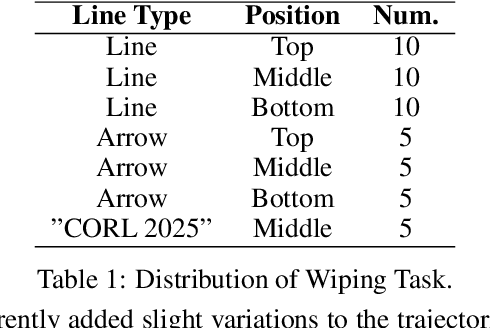
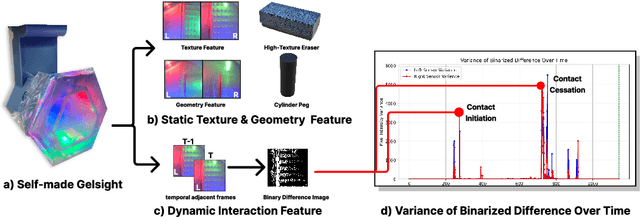

Abstract:Visuotactile sensing offers rich contact information that can help mitigate performance bottlenecks in imitation learning, particularly under vision-limited conditions, such as ambiguous visual cues or occlusions. Effectively fusing visual and visuotactile modalities, however, presents ongoing challenges. We introduce GelFusion, a framework designed to enhance policies by integrating visuotactile feedback, specifically from high-resolution GelSight sensors. GelFusion using a vision-dominated cross-attention fusion mechanism incorporates visuotactile information into policy learning. To better provide rich contact information, the framework's core component is our dual-channel visuotactile feature representation, simultaneously leveraging both texture-geometric and dynamic interaction features. We evaluated GelFusion on three contact-rich tasks: surface wiping, peg insertion, and fragile object pick-and-place. Outperforming baselines, GelFusion shows the value of its structure in improving the success rate of policy learning.
 Add to Chrome
Add to Chrome Add to Firefox
Add to Firefox Add to Edge
Add to Edge